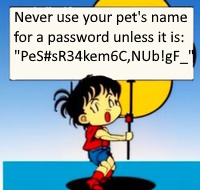
Keeping clients' computers safe and profitable for over 30 years
Home Forms About Current Newsletter subscribe
Search All Articles
Browse by Category

Never Use the Same Password Again
Preview:
Here are 4 simple ways to help preserve your privacy online. Each one is presented simply and with links you can use. All these methods are free.
There are databases available on the dark web with billions of username and password combinations. For years websites have been breached and the usernames and passwords stolen. I have found out about 15 times major companies have lost my username and or password in major data breaches. The first I know about was Adobe from 2013 where they lost 153 million accounts including mine. LinkedIn was breached in 2016 (164 million lost accounts) and again in 2021 (at least 125 million unique email addresses).
Another 12 breaches, however, were companies I've never heard of who accumulate data to sell. Sometimes they sell email addresses for spamming purposes, sometimes for hiring or government databases, sometimes for better targeted ads. Often to assist phishing attackers impersonate you to access your accounts.
I'm also on 2 databases of email addresses, some with passwords, that are just posted and no one knows where they come from.
There is little we can do about this. Facebook, Google, Amazon and others all collect and sell our data. The people they sell to are juicy targets for hackers and don't appear able to protect the data they buy.
22 Billion usernames and passwords in a single database!
There are many databases of username and password combinations on the dark web. One of them has 22 billion entries. We are all probably on it.Never use any password that anyone in the world (including you) has ever used before.
Norton Lifelock and Paypal User Accounts Breached
Both Norton Lifelock and Paypal had user accounts breached recently. They were attacked by battalions of botnets who signed into accounts using combinations from those databases. It appears that such attacks work about 1 time in 1,000. So, a tiny botnet of just 10,000 robots, trying 1 attempt each per second would produce 600,000 attempts in a minute. This would yield about 6,000 successful attacks in 10 minutes.Use a Password Manager
I recommend Keepass on the desktop and Keepass2Android for Android. If you need to keep your passwords online, instead of locally on your machine, then I recommend Bitwarden.Further Reading
- Tracking important information with your password manager
- Review your Password System
- The best password managers
Date: April 2023

This article is licensed under a Creative Commons Attribution-NoDerivs 3.0 Unported License.